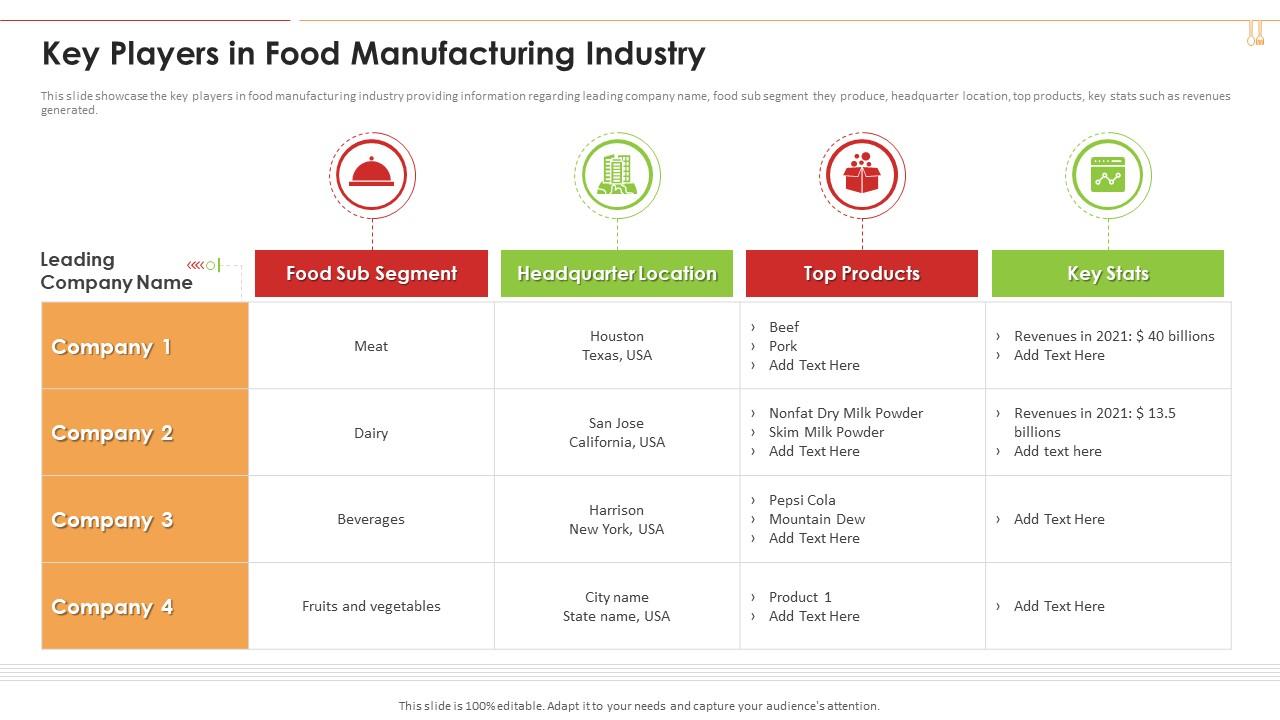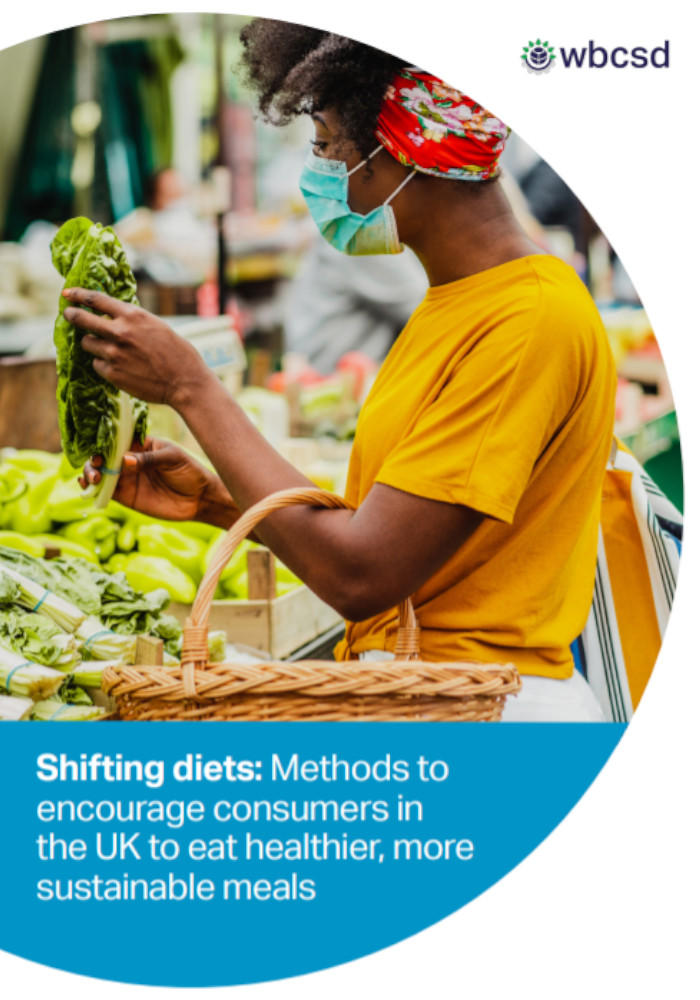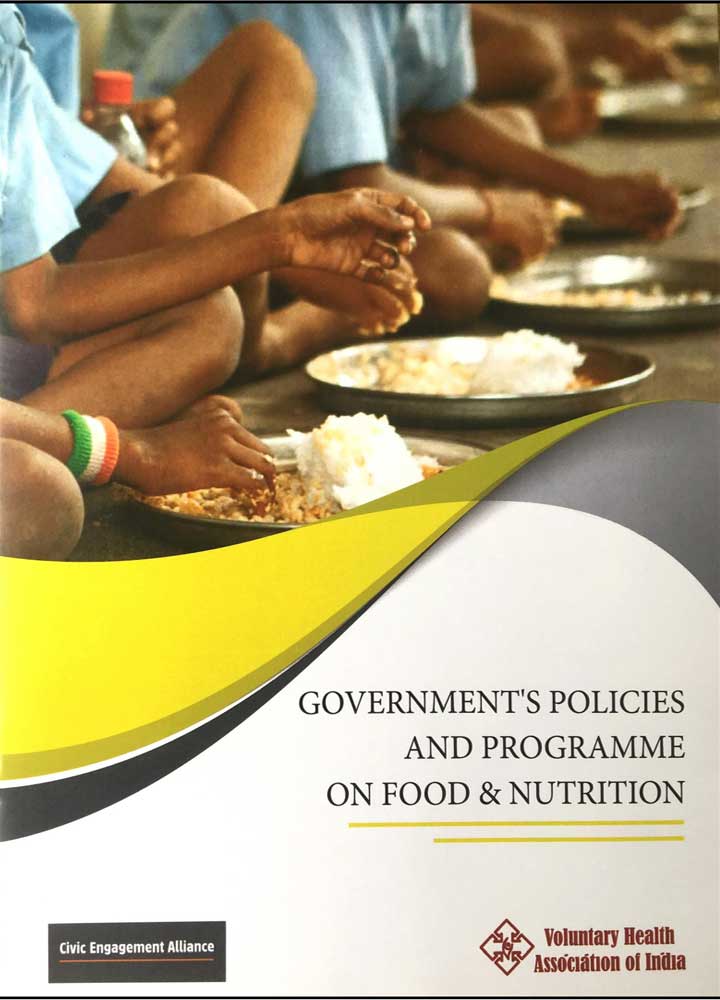Food Industry Presentation
| Introduction to the Food Industry | ||
|---|---|---|
| The food industry is a diverse sector that encompasses various activities related to the production, processing, distribution, and consumption of food products. It plays a crucial role in providing sustenance and nutrition to the global population. The food industry is influenced by factors such as consumer preferences, technological advancements, and regulatory frameworks. | ||
| 1 | ||
| Key Players in the Food Industry | ||
|---|---|---|
| The food industry consists of various key players, including farmers, manufacturers, distributors, retailers, and foodservice providers. Farmers play a vital role in growing and producing raw materials, such as fruits, vegetables, grains, and livestock, which are essential for food production. Manufacturers transform raw materials into processed food products through various processes such as milling, baking, canning, and freezing. | ||
| 2 | ||
| Food Safety and Quality | ||
|---|---|---|
| Food safety and quality are of utmost importance in the food industry to ensure that consumers are protected from potential health risks and receive nutritious products. Safety measures include proper handling, storage, and transportation of food, as well as adherence to hygiene and sanitation practices. Quality control systems, such as certifications and inspections, help maintain consistent product quality and meet regulatory standards. | ||
| 3 | ||
| Trends in the Food Industry | ||
|---|---|---|
| Consumer demand for healthier and more sustainable food options has led to a rise in plant-based and organic products. Convenience foods, ready-to-eat meals, and online food delivery services have gained popularity due to changing lifestyles. Technological advancements, such as automation, artificial intelligence, and blockchain, are being adopted to improve efficiency, traceability, and transparency in the food supply chain. | ||
| 4 | ||
| Globalization and Trade in the Food Industry | ||
|---|---|---|
| Globalization has facilitated the exchange of food products across borders, allowing consumers to access a wide variety of cuisines and ingredients. International trade agreements and regulations play a crucial role in facilitating and regulating the import and export of food commodities. However, globalization also raises concerns about food security, sustainability, and the impact on local food industries. | ||
| 5 | ||
| Challenges in the Food Industry | ||
|---|---|---|
| The food industry faces challenges such as rising production costs, environmental impact, and limited natural resources. Food waste and loss during production, distribution, and consumption pose significant challenges to achieving sustainable food systems. Ensuring food security for a growing global population while minimizing the impact on climate change remains a pressing challenge. | ||
| 6 | ||
| Innovation and Future Outlook | ||
|---|---|---|
| The food industry is constantly evolving, driven by innovation in areas such as alternative protein sources, food technology, and packaging solutions. Increasing focus on personalized nutrition and functional foods that offer health benefits is likely to shape the future of the industry. Adopting sustainable practices, reducing food waste, and embracing circular economy principles will be crucial for the long-term success of the food industry. | ||
| 7 | ||
| Consumer Preferences and Changing Food Culture | ||
|---|---|---|
| Consumer preferences are influenced by factors such as taste, health, convenience, and affordability. Changing food culture and dietary patterns, influenced by globalization and urbanization, impact the types of food products and cuisines that gain popularity. The food industry must adapt to these changing preferences and cater to diverse consumer needs through innovative product development and marketing strategies. | ||
| 8 | ||
| Government Regulations and Food Policies | ||
|---|---|---|
| Governments play a crucial role in regulating the food industry to ensure food safety, quality, and fair trade practices. Food policies, such as nutrition labeling, food fortification, and advertising regulations, aim to protect consumer interests and promote public health. Compliance with local and international food regulations is essential for businesses operating in the food industry. | ||
| 9 | ||
| Conclusion | ||
|---|---|---|
| The food industry is a complex and dynamic sector that plays a vital role in providing sustenance and nutrition to the global population. Addressing challenges such as food safety, sustainability, and changing consumer preferences requires collaboration and innovation across the entire food supply chain. By embracing technological advancements, adopting sustainable practices, and prioritizing consumer needs, the food industry can continue to thrive and meet the demands of a rapidly changing world. |  | |
| 10 | ||
| References (download PPTX file for details) | ||
|---|---|---|
| Food and Agriculture Organization of the Unit... World Health Organization: https:// www.who.i... United States Department of Agriculture: http... |  | |
| 11 | ||








